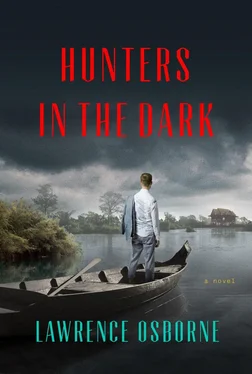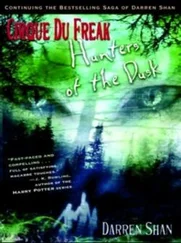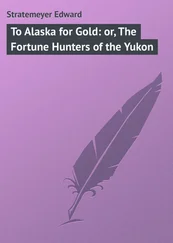“No, sir.”
“Is it all right for him to go alone?” Robert asked.
“Sure it is. Everyone knows everyone here. He won’t do anything amiss. He knows I’d find him.”
When Ouksa had gone and the car had begun its short trip up to the Alpha, Simon filled his glass again and put fresh ice into it.
“All the same, Robert, you should be a little careful moving around with that kind of money. It could be tempting for some people. Not for this one. But others. Two grand is a fortune here.”
—
They watched the slow river for a while. Someone holding a lantern at the end of a stick moved along the opposite bank, the light flickering behind reeds and trees, and you could tell that it was swollen by the rains. Near the reeds the water rustled against debris and the edge of moon lit the smooth, unctuous surface as it constantly shifted. All along its length the frogs sang at full throttle, a sinuous chorus that seemed to possess a relaxed relentlessness, and it served to calm slightly jangled nerves, the apprehension that for Robert always came with night. He let go of his glass finally and sank back against the pliant plastic chair. His skin was dry; his eyes felt keen and lucid. He wasn’t nervous at all, but he was not at his ease either. It was surprisingly easy to linger between these two states of mind.
“It’s a damn warm night again,” Simon said. “But it’ll get hotter tomorrow. Does it bother you?”
“I’m getting used to it.”
“It’s cool by the river. It’s why I live here, of course. On the river, I mean.”
Robert said he loved rivers too.
“It’s a British and American thing,” Simon said.
“Is it?”
What did that mean? Robert wondered.
Simon took out a cigar box, opened it and took one out. He left it open and asked “Smoke? They’re bergamot cheroots I get in Burma.”
“All right. It’s been a while since I had a cheroot.”
“Why’s that? Don’t have them in England?”
“We have a few. I just don’t smoke them.”
“Is that right, hombre? Well, we got more here than that. These are fine enough. Not Cuban, but they’ll do. Of course they’re not cigars.”
Simon smiled, lit up both cheroots and closed the box. Soon the smoke had enveloped the table and the river breeze did not remove it. There was something manly and satisfying about it. The scent of bergamot, like a pot of brewed Earl Grey tea.
Simon continued his questions, about which he was quite casual and slow, as if it was just the normal pace of his curiosity. A barang who did not talk with another barang all that frequently. One had to wonder if he was lonely up here on the river of Battambang. He didn’t seem lonely or even put out. There was something, to the contrary, smoothly oiled and implacable about him. As if he was used to questions and answers.
“Moving on soon?” he asked Robert.
“I guess I should be. Though honestly I hadn’t thought about it.”
“Where to?”
Robert shrugged. “Phnom Penh — maybe.”
“It’s an underrated city. Lots of girls there.”
“It’s all right, I’m not going for the girls.”
“You don’t have to be prickly with me about things like that. Visitors like you are always much more moral and decent in word than they are in deed. It’s OK. Everyone’s the same.”
“I hadn’t really thought about it.”
“Oh, sure you thought about it. Everyone thinks about it.”
“Even if I thought about it I wouldn’t do it.”
Simon smiled. “You young barangs are so earnest. Wait till you’re forty.”
“Are you forty?”
“Damn near close. I’m trying to find a way to avoid getting there.”
“Well, good luck with that.”
“I wouldn’t leave it to luck. Maybe I’ll just change names.”
“Anyone can do that.”
“So,” Simon drawled, not looking up, “are you going to take a bus tomorrow?”
“Maybe.”
“You can take a boat down there too. I have a boat I use myself. I can call the guy down for you. He’ll be here any time you like.”
“Is that the best way to go?”
“Sure it is. Relax, take the sun on the deck. And all that.”
“All right then. Maybe I will.”
“You do say maybe a lot, Robert. Life is not maybe.”
“All right, I will take the boat.”
“That’s better.”
“Do you have business there?”
“I’m on holiday.”
“Ah yes. Holidays. I forgot about them.”
They smiled. Simon eyed him carefully over the edge of his glass.
“I say we have three chess games. Best of three. All right with you?”
“I’ll do my best.”
“That’s the spirit. You know, Robert, you seem like a sport. When I saw you at the temple earlier I thought, He’s a sport, you can tell from his body language. Well, that’s what I say. You can tell a man’s a sport from his body language. And from his shoes of course. I gave you a pass on the shoes. But overall I think I was right. You wouldn’t believe many of the people who come through here. Pure Flintstones. I don’t look down at them but it’s how I feel. One can’t help it. It’s like they come here to die and they aren’t sports about it either. They do it as if they’re too lazy to do it properly. In fact a lot of them do. They throw themselves in the river. Three or four bodies wash up every week, barangs down on their luck and tanked up with Yaa Baa. It’s a cottage industry for the crematoria at the monasteries. I never can figure out who pays for the funerals.”
Simon looked out across the waters, momentarily distracted, and picked a shred of tobacco from his lip.
“Well, I pay for some of them, if you want to know. I have the money. I don’t care. It seems a damned shame to let some kid go uncremated because no one came in to claim the body.”
“Then you are a sport too.”
“It’s nice of you to say. I think of myself as the guardian of this part of the river. I watch over it, you see.”
They mixed the Royal Stag with soda now and made it very cold.
“You’re lucky you can live like this,” Robert said. “You must have a business here.”
“I had the money when I moved here.”
That’s luck, Robert thought. The lucky have great timing.
“Back in the days when the dollar was high,” Simon went on, swirling his ice. “Back when we were rich. It’s a rather different story now, isn’t it?”
“I’ll say.”
“But you came into a bit of cash.”
“I didn’t think I’d win it in a casino.”
“It’s a sign. The Khmers believe in signs. Every sign means something. When my housekeeper told me about it I laughed and I thought, There’s a sign if I’ve ever heard of one.”
“Your housekeeper?”
“News travels on gossamer wings. She told me and we agreed it was a real sign.”
“Of what?”
“Who knows — one never knows. That we would meet tonight? That we would play chess? You have to think in the Khmer way.”
They were laughing and Simon was thinking how much more elegant Robert would look with a proper pair of shoes. He was a good-looking boy all the same, a boy with swing and lilt and charm. The English farmlands in his cream complexion and open skies in the eyes. It was a charm that survived all changes in locale, one felt it quickly and it was not something one could walk back from. But his English solidity let him down. He was still harnessed to another way of life, you could see the cowed look in his eyes.
Robert, for his part, had begun to give in to this charm offensive even as his mind kept returning to that grisly image of bodies floating down the river. He congratulated himself on ignoring Ouksa’s advice. Simon, he reasoned, was not understandable to a Khmer boy with no experience of the wider world. He was an oddity even in the Western context. To Robert, in those slightly giddy moments, he suggested a man of another age, an anachronism that was appealing for all the affectation it implied. There was a subtle menace about him, but it never quite broke into open view.
Читать дальше












